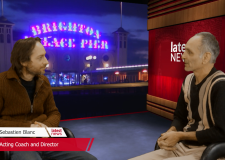Flip Brit
The thing about being British is that it can mean so much to so many people. It’s on trend currently to say that you almost feel ashamed to say you’re British because of what the British Nationalist Party and the like have made it represent in the media and to the country at large. You can’t fly a Union Jack when there isn’t a football match on. Shame! As if there is something about being British of which we should be intrinsically proud. Except with every absolute there is an absolute danger. Ever had a look at what being British in the last 300 years on a global scale actually means? Jeremy Paxman has stepped up to the plate (an American metaphor for you there) to examine precisely what the British Empire achieved, inflicted and produced. Good will was not high on its list of achievements.

The very first episode of Empire examines Britain’s taste for power. It’s easy to say that Jeremy Paxman, who wrote and presented this series, makes everything sound like an accusation, but when you look at the facts there is an awful lot to be accused of. Among his search of history, Paxman twice throws in the question: “Did the British do nothing good?”, once in Egypt and another time in Israel. These are people happy to be interviewed, and as friendly as they are to Jeremy this is a concession too far. ‘No, nothing good came from the British residency here’, is the unequivocal answer.
“It’s 300 years of expansion, occupation and conning.”
It’s interesting to see that without the pomp and ceremony – some of it actually purchased from a theatrical establishment to ensure the splendour of the thing – there may have been little more than smoke and mirrors holding such an expansive and at times extremely brutal system in place.
This is the first in five episodes, promising to cover the empire’s effect on sport, slavery and much more. It’s all very well to sing about Britannia ruling the waves once a year with a flag painted on your face in the Royal Albert Hall and think that that’s patriotism, but unless you’re prepared to acknowledge the shame with the pride of patriotism perhaps it’s no better than a badge left over from a band you used to like when you were 13. With such a superficial allegiance, such a blindness, is anybody else any better than the extremist caricature criticised so roundly as the spoiler of patriotism?
Clearly, this is a thought-provoking programme. It’s odd to hear Jeremy Paxman trying to have a conversation rather than giving somebody a grilling, but his journalistic chops do get stuck in. He moves between referring to ‘the British’ and ‘us’ in phrasing his questions, hinting at the popular journey-for-the-presenter-too format, but thankfully not embracing or even recognising it. The brutality of the subject attracts the rubbernecker viewer, appalled and enthralled by it, and then snaps shut on them (including me) and teaches a history usually told from the other side, written by Victorian generals and viceroys. Or simply not taught at all.
Empire, BBC1, Monday 27 February 2012, a part of the Open University programmes




















